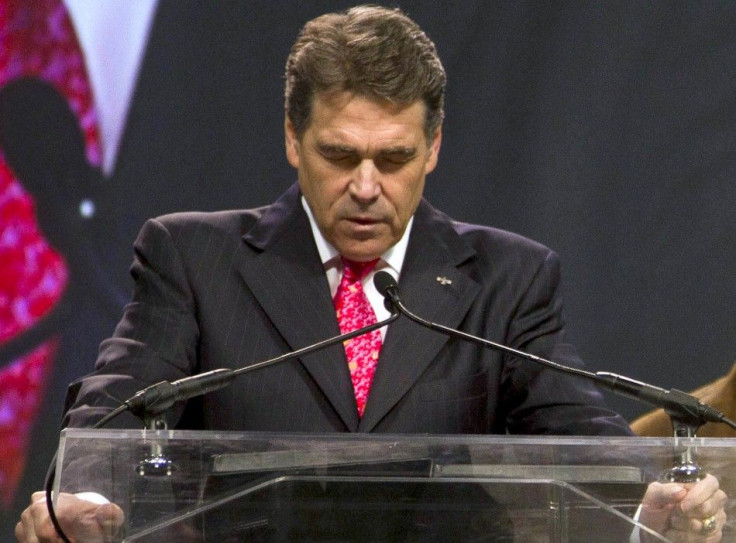Rick Perry for President: Five Reasons the Texas Governor Can Beat Barack Obama
Analysis

Texas Governor Rick Perry has made it official -- he's in the running for the 2012 Republican Presidential nomination.
But it wasn't Republicans Perry came out swinging at in his announcement but Democratic President Barack Obama, the one Perry expects to meet in the general election in November 2012.
Ordinarily, Obama, the incumbent, would have a big advantage in a presidential race like this, featuring new names on the national scene, like Rep. Michele Bachmann, a Tea Party Republican, and Perry.
But the Texas governor became a formidable player the moment he jumped into the presidential race.
Whether people like him or not -- and there seems to be a sizable lot on both sides of that equation -- everybody must admit that based upon a variety of factors Rick Perry, presidential candidate, has a very good shot of becoming Rick Perry, President of the United States.
Here's five reasons Rick Perry could make a successful run to the White House:
1) Barack Obama's "change" platform he ran upon last time is a competitive Achilles heel in a re-election campaign, considering the poor state of the U.S. economy.
Maybe it's not fair -- nobody said politics are fair -- but the last time Obama swept into the White House with the dreamy-eyed support of America behind him. He talked of change, and people believed change could happen.
But while Obama undoubtedly meant well, the change that has transpired has been different than the change he talked of.
That's not to say it's all his fault -- but the reality around them is all that voters have to deal with. And that reality has been pretty harsh lately. Consumer sentiment fell to the lowest level this month according to one reading since the recession of 1980.
Obama promised things would get better when he took office, and they are not. With unemployment remaining above nine percent two years after the official end to the recession and with the federal government's budget deficit now above $14.5 trillion, Obama will have a hard time selling his platform of change to voters a second time.
2) Americans from all backgrounds and ideologies are sick of Washington politics and big-government, and Rick Perry wants to take Washington out of our daily lives.
"I'll work every day to try to make Washington, D.C., as inconsequential in your life as I can," said Perry, in making the announcement for his presidential bid.
Whether Perry can do that or not remains to be seen. The argument here is only noting why Perry can win, not whether he will do a good job if he does. In the election, what matters most is striking a chord with the voters, and we saw in the mid-term elections that many Americans feel strongly about smaller government.
I've also got a hunch that after the grisly debt ceiling talks -- even though some key Republicans were responsible for the tone and mediocre results -- Perry's talk of smaller government to the people will resonate with many, particularly swing voters fed up with Washington's big mess.
3) Perry will attack Obama for letting the federal budget deficit spiral to beyond $14 trillion and many voters will listen. We know that former President George W. Bush gets some blame for the deficit, and we know that Obama came into office just as the American economy fell into the Great Recession.
But we also know that voters don't care. The bucks stops with the person in charge, the President of the United States.
While Obama talked a strong line at times about cutting the deficit during debt talks, many observers feel he was a bit too late to that game. With America in a recession and the federal budget bloating, he pushed through the controversial health care bill, as one example, when a bit more planning and cost assessment to get it right and spare the budget might have been a better move.
Regardless, Americans aren't very good at history. They have a short memory. All they know is that Obama is the President of the United States at this moment, and at this moment the federal government has a deficit of $14.5 trillion -- a figure that is about to bring this nation to its economic knees.
When Rick Perry says, "You cannot win the future by selling America off to foreign creditors," he might as well be saying this: "It's the deficit, stupid."
4) Perry is a state sovereignty advocate and the state sovereignty movement is growing some states in America. From Arizona to Tennessee, we've seen states increasingly yearn for individualism from the ways of Washington.
Perry says America is not broken. Washington is broken, he says, and the majority of citizens in many states increasingly feel this way.
Why should they have to submit to Washington's foolishness on issues involving health care, immigration, and more?
Obama and Perry are quite divided on this issue, and while the majority of Americans may not care -- the passionate ones in key states who do care might give Perry an energetic boost.
5) In a period of prolonged economic difficulty, many among America's middle class have started to preach that we've strayed to far from our core values in this country. Perry is preaching the very same thing.
If Perry connects with voters beyond evangelicals on this, he'll be a powerful candidate.
Perry is not afraid to stand at the lectern and pray -- and many fence-sitting, middle-of-the-road Democrats, including labor union members and others who think the devil-made-us-do will likely find Perry's commitment to faith a welcome change.
And, while it's true that Obama has made clear that he's a Christian, Perry showed America last week at The Response prayer event he organized in Houston that he's got an approachable evangelical flair -- and he's not afraid to use it.
© Copyright IBTimes 2024. All rights reserved.





















